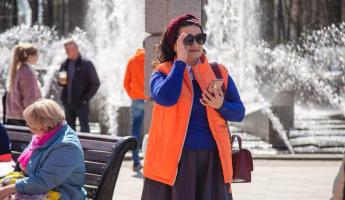У чарговай порцыі сакрэтных матэрыялаў перапіскі дзярждэпартаменту ЗША, якія публікуюцца сайтам WikiLeaks, прадстаўлена падрабязная справаздача аб сустрэчы прэзідэнта Грузіі Міхаіла Саакашвілі з намеснікам міністра абароны ЗША па пытаннях міжнароднай бяспекі Аляксандрам Вершбаў, якая адбылася 19 кастрычніка 2009 года. Згодна з дакументам, у ходзе сустрэчы грузінскі лідар выказаў надзею на тое, што ЗША "знойдуць стымулы для Беларусі, якія дазволяць перашкодзіць афіцыйнаму прызнанню ёю Абхазіі і Паўднёвай Асетыі".
У гутарцы з прадстаўніком ЗША Міхаіл Саакашвілі выказаў асаблівую заклапочанасць з нагоды магчымага прызнання Беларуссю незалежнасці Абхазіі і Паўднёвай Асетыі. Па словах грузінскага лідара, пазіцыі прэзідэнта Беларусі Аляксандра Лукашэнкі і расійскага прэм’ера Уладзіміра Пуціна па дадзеным пытанні істотна разыходзяцца. У сувязі з гэтым Міхаіл Саакашвілі прапанаваў ЗША «прапанаваць моркву» Беларусі з мэтай перашкодзіць магчымага прызнання Абхазіі і Паўднёвай Асетыі.
Міхаіл Саакашвілі заявіў, што асноўнай матывацыяй для Аляксандра Лукашэнкі з’яўляюцца грошы, а расійскае кіраўніцтва прапануе Беларусі кампенсацыю за вырашэнне дадзенага пытання. Між тым прэзідэнт Грузіі выказаў меркаванне, што любая прапанова з боку Захаду і, асабліва прапанова праграмы ваеннага навучання і адукацыі (IMET) з боку ЗША, зможа паўплываць на рашэнне беларускага кіраўніцтва.
Па словах грузінскага лідара, афіцыйны Мінск уважліва сочыць за дзеяннямі ЗША, і апошні візіт віцэ-прэзідэнта Байдэна ва Усходнюю Еўропу стаў прычынай затрымкі з рашэннем аб прызнанні Абхазіі і Паўднёвай Асетыі. Міхаіл Саакашвілі таксама праінфармаваў амерыканскіх чыноўнікаў аб тым, што Беларусь звярнулася з просьбай прыняць у Тбілісі беларускіх экспертаў для вывучэння дзеянняў Расіі падчас вайсковага канфлікту 2008 года і аналізу спрэчных аспектаў гэтых падзей. Грузія пагадзілася прыняць экспертаў.
Саакашвілі: Лукашэнка патрэбен хтосьці, хто пакажа яму дарогу да рэформаў
Акрамя таго, з дэпешы дзярждэпартаменту, апублікаванай выданнем «Рускі рэпарцёр», вынікае, што Міхаіл Саакашвілі перакананы, што Беларусь знаходзіцца ў пошуках альтэрнатывы Крамлю, а Аляксандр Лукашэнка мае патрэбу ў кімсьці, хто «пакажа яму дарогу» да рэформаў. Тым не менш, Аляксандр Вершбаў у ходзе сустрэчы выказаў сумнеў у зацікаўленасці беларускага лідара ў правядзенні рэформаў.
Акрамя таго, згодна з апублікаваным дакументам, намесніка міністра абароны па пытаннях міжнароднай бяспекі ЗША пераконвалі грузінскага лідара не спыняць рэформы, накіраваныя ў перспектыве на ўступленне Грузіі ў НАТО. У сваю чаргу грузінскі прэзідэнт заявіў, што Грузія не гатовая рэалізаваць патэнцыяльныя магчымасці ЗША, але мае патрэбу ў паглыбленым садзейнічанні ў сферах абароны і бяспекі.
Міхаіл Саакашвілі таксама выказаў меркаванне, што Расія не будзе гуляць станоўчую ролю ў справе адкрыцця межаў на Паўднёвым Каўказе, бо гэта не ў яе інтарэсах, і будзе перашкаджаць развіццю адносін паміж Турцыяй і Арменіяй і вырашэнню канфлікту ў Нагорным Карабаху. Па словах грузінскага лідара, Расія з’яўляецца праціўнікам якіх-небудзь кампрамісаў і аддае перавагу, каб на Паўднёвым Каўказе захоўваліся супярэчнасці, а межы былі б закрытыя. Міхаіл Саакашвілі выказаў меркаванне, што Расія чакае, пакуль ЗША адыдуць у бок, каб працягнуць «жангляваць рэгіянальнымі праблемамі», істотнымі для ЗША — Іранам, Турцыяй і Грузіяй.
Вершбаў: ЗША не адчувае ілюзій наконт сапраўдных намераў Расіі
У сваю чаргу Аляксандр Вершбаў адзначыў, што ЗША не адчуваюць ілюзій наконт сапраўдных намераў Расіі, і таму маюць намер распрацоўваць сумесныя доўгатэрміновыя планы і стратэгіі. У гутарцы з грузінскім лідарам Аляксандр Вершбаў заявіў, што ЗША маюць намер працягваць падтрымліваць тэрытарыяльную цэласнасць Грузіі і перашкаджаць працэсу прызнання Абхазіі і Паўднёвай Асетыі з боку іншых краін.
Акрамя таго, у ходзе перамоваў Міхаіл Саакашвілі неаднаразова падкрэсліваў, што пасля ўварвання ў Грузію ў 2008 годзе ён чакаў, што Расія ўвойдзе ў Крым. На яго думку, Расія мае намер нагнятаць напружанасць на паўвостраве, каб затым прапанаваць украінскаму кіраўніцтву сваю дапамогу ў вырашэнні праблемы. Міхаіл Саакашвілі заявіў, што Расія мае намер і далей аказваць ціск на Грузію і Украіну, «каб падаць урок іншым краінам на постсавецкай прасторы».
Арыгінал:
CONFIDENTIAL SECTION 01 OF 03 TBILISI 001965 SIPDIS EO 12958: DECL: 10/26/2019 TAGS: MARR, MASS, PREL, RS, UP, BO, GG SUBJECT: GEORGIA: MISHA TELLS ASD VERSHBOW GEORGIA IS COMMITTED TO PEACEFUL INTEGRATION AND A LONG-TERM DEFENSE REFORM PROCESS Classified By: Ambassador John R. Bass for reasons. 1.4 (b) and (d).
1. (C) SUMMARY. President Saakashvili assured visiting Assistant Secretary of Defense for International Security Affairs Alexander Vershbow that Georgia understands there will be no military solution to the conflicts — only Georgia’s further progress on democratic and economic reform could re-attract the separatist regions of Abkhazia and South Ossetia in the long term. Vershbow urged Georgia to remain committed to the reform process which will lead Georgia eventually to NATO membership. Saakashvili predicted that Russia was unlikely to play a helpful role in opening borders in the South Caucasus and would work to prevent the development of relations between Turkey and Armenia and the resolution of the conflict in Nagorno-Karabakh. Saakashvili recognized that Georgia was not ready for US capabilities, but required deepened defense and security assistance. Saakashvili assured Vershbow that Georgia would not stand in the way of MAP accession for Montenegro and asserted that Russia intends to keep pressure on
Ukraine to fall in line with the Kremlin. Saakashvili hoped the United States would find incentives for Belarus not to recognize the independence of Abkhazia and South Ossetia. End Summary.
SECURITY CONCERNS AND U.S. ASSISTANCE
2. (C) ASD Vershbow told Saakashvili during a meeting on October 19 that the establishment of the Security Working Group showcased the importance the US places on Georgia’s security. The goal of the U.S. was to prevent a repeat of last year’s conflict between Georgia and Russia. There was a need to create space for Georgia’s political, economic and security sector reforms. The U.S. will continue to support Georgia’s defense reform and professionalization in a step-by-step approach. The U.S. stands by the principle that Georgia has a legitimate right of self-defense and the US will not recognize any arms embargo of Georgia. At the same time, Georgia was under a microscope — not only in Moscow, but in the West — and it was in our common interest to proceed carefully. ASD Vershbow emphasized the U.S. understands that Georgia’s security is a critical component to progress on democratic reform. The U.S. expects Moscow to criticize any cooperation with Georgia on the security front and the US is prep ared t
o deal with that criticism. For this reason, it is imperative that the U.S. and Georgia coordinate messaging, as there is a need to avoid Russia exploiting US-Georgia cooperation.
3. (C) Saakashvili thanked ASD Vershbow for strong signs of US support, as security cooperation is crucial for Georgia’s survival. U.S. visits and signs of support, such as exercises and ship visits have second-order effect, as the business community is calmed by US presence. Investment grows when there is perception that Georgia is not isolated. Saakashvili assured ASD Vershbow that Georgia will not give Russia a pretext for an attack. That said, Saakashvili stressed that time matters, as Georgia needed a deterrent. If Russia believed it will be easy to attack Georgia, the possibility of such an attack will increase. Saakashvili told ASD Vershbow that he personally had disagreed with former Secretary of State Rice’s position opposing MANPADS sales to Georgia in 2008 (Saakashvili stated Poland ignored Qsales to Georgia in 2008 (Saakashvili stated Poland ignored US opposition to the sale). ASD Vershbow reminded Saakashvili that even with added capabilities, Georgia needed to be realistic as it could neve
r defeat Russia. ASD Vershbow asked Saakashvili to r econfirm Georgia’s position that there is no military solution to the conflicts — Saakashvili readily agreed but asserted that that every minute of dela of Russia’s invasion mattered because only international intervention had prevented Russian tanks from rolling into Tbilisi.
4. (C) Saakashvili admitted that Georgia was not ready for US capabilities, noting «we are not ready, we know this.» He stressed, however, that the process of defense capabilities needed to start somewhere and Georgia had a right to understand the timelines involved. Georgia agreed on the need for a multi-year long-term defense reform process. Saakashvili highlighted that Georgia’s partners calibrated their own defense assistance on US action, or lack thereof. ASD Vershbow reiterated the need for a phased approach to defense reform, which will require Georgia to move in a step-by-step manner that ameliorates concerns. Deepened assistance will be enhanced by a process of education, training and improved professional management. TBILISI 00001965 002 OF 003 ASD Vershbow emphasized that support for defense reform and modernization is a long-term process and a long-term commitment by the US
5. (C) Saakashvili told the ASD that he viewed Russia’s invasion in 2008 as a direct result of the West’s recognition of Kosovo and his own government’s pursuit of NATO membership. Russia’s fundamental intent was to reconstitute the former Soviet Union. Vershbow told him that the U.S. has no illusions about Putin’s intentions — therefore, it was critical that we work closely together to develop long-term plans and strategies. Deputy FM Giga Bokeria said that the Georgian government was in the process of developing a strategy for the separatist regions that would emphasize positive investments for bringing people together in the future. When asked directly if the Georgian side would be flexible about travel arrangements for Abkhazians to permit them to study in the West rather than Russia, Bokeria acknowledged the need to engage the people of the separatist regions and Georgia was working on a policy.
NATO ASPIRATIONS
6. (C) Saakashvili told ASD Vershbow that MAP accession for Montenegro would not be a problem for Georgia but it would have disastrous effects in Ukraine. Deputy Prime Minister Giorgi Baramidze urged the Alliance to craft a statement carefully in order to emphasize each country’s unique path to membership.
REGIONAL DEVELOPMENTS IN THE SOUTH CAUCASUS
7. (C) Saakashvili asserted that the opening of borders in the South Caucasus — specifically between Armenia and Turkey and any future progress on Nagorno-Karabakh — was counter to Russia’s interests. Russia did not want to be part of any solution and preferred to keep the South Caucasus dissonant and the region’s borders closed. Saakashvili said he believes Russia is counting on the US to back away while Russia juggles the regional issues that matter most to the US: Iran, Turkey and Georgia. Bokeria noted the appointment of former Russian Ambassador to Georgia Vyacheslav Kovalenko to be Russia’s new Ambassador to Armenia, recalling his reputation as a «disciplinarian» from Moscow would not go unrecognized in Yerevan.
CONCERN ABOUT POTENTIAL «CASCADE» OF RECOGNITIONS
8. (C) Saakashvili expressed specific concerns about whether Belarus would recognize the independence of Abkhazia and South Ossetia. Saakashvili stressed that Lukashenko and Putin disagree significantly and urged the US to offer carrots to Belarus to prevent recognition. He argued that Lukashenko was motivated primarily by money — and that the Russian government was promising a payoff. Saakashvili suggested that any offer from the West — and, in particular IMET from the US — Could impact decision-making in Minsk. Belarus was sensitive to U.S. moves, as the recent Vice President Biden visit to Eastern Europe had delayed recognition. Belarus wants an alternative to the Kremlin and Lukashenko needs someone to «show him the way» to reform. ASD Vershbow questioned Lukashenko’s interest in reform, with Deputy FM Giga Bokeria interjecting that Lukashenko understands there would be no long-term gain for Belarus if Russia strengthened its control. Saakashvili noted that Belarus has asked to send experts to Tbil
isi to review Russian actions during the 2008 war in order to analyze QRussian actions during the 2008 war in order to analyze Russia’s action and draw necessary lessons learned. Georgia had agreed to the request.
9. (C) On the question of recognitions by other countries, mostly in Central and Latin America, ASD Vershbow assured President Saakashvili that the United States would continue to support the territorial integrity of Georgia and discourage recognition. ASD Vershbow urged the Georgians to understand that in many of the countries considering recognition, the United States had limited ability to influence their policies.
10. (C) ASD Vershbow urged the Georgian president to think creatively about venues for discussions on security issues. CFE discussions and talks on Medvedev’s proposals on European Security could be turned into areas of discussion that benefitted Western interests.
TBILISI 00001965 003 OF 003 UKRAINE — NEXT ON PUTIN’S TO DO LIST?
11. (C) Saakashvili stressed repeatedly that he expected Russia to follow its 2008 invasion of Georgia with intervention in Crimea. He predicted that Russia would incite tension in the peninsula and then make a generous offer to Yanukovych (presumed as the next president) to help solve the problem. Saakashvili said that Putin wants to keep the pressure on Ukraine and Georgia as a lesson and a warning to others in the former Soviet Union.
12. (U) This message was cleared by Assistant Secretary of Defense Vershbow. BASS
















